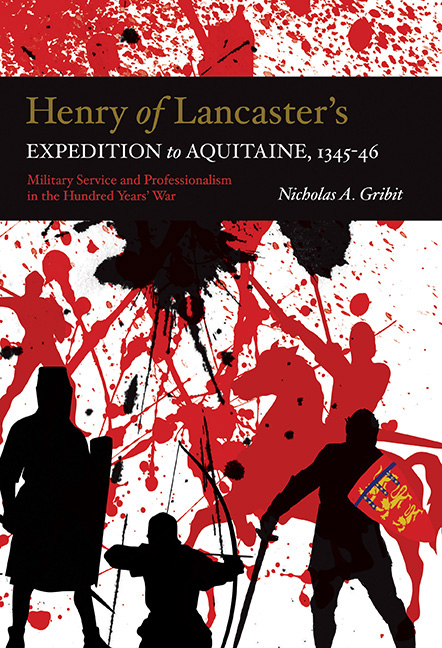 Henry of Lancaster's Expedition to Aquitaine, 1345-1346
Henry of Lancaster's Expedition to Aquitaine, 1345-1346 from Part III - Military Service and the Earl's Retinue for War
Published online by Cambridge University Press: 05 July 2016
If ‘the size and splendour of a magnate's retinue signalised his importance in the [medieval] world’, then Henry of Lancaster must have been considered one of the most important men of his time. The comitiva(retinue) which Lancaster assembled for war in 1345 was not only the largest of the retinue contingents which set out to Aquitaine in that year, but the largest ever to be mobilised for any military expedition up to that date. It was a harbinger of the ‘super-retinues’ which characterised the structural composition of the English armies of the second half of the fourteenth century and more importantly, from a historian's point of view, it remains the most fully documented of the retinue contingents in Lancaster's army.
The subject of the military retinue has received much scholarly attention over recent decades, but an in-depth study of a single English retinue which campaigned in France up to the Treaty of Brétigny (1360) has rarely been undertaken. As a result of the recent rediscovery of the missing portion of Lancaster's 1345 retinue roll, the men who served under his banner in Aquitaine now can be seen to represent the largest military retinue of the first half of the fourteenth century for which there is full nominal evidence of the entire troop, that is to say, the identities of all of the men are known to us. This provides a unique opportunity to investigate the formation and structure of a war retinue of exceptional size based firmly on prosopographical evidence of the individuals who took up the sword (or indeed the bow) with Lancaster. Such an approach can modify Kenneth Fowler's earlier assessment of the earl's comitiva, and further our understanding of the means by which a magnate could raise a retinue of unprecedented magnitude in the mid 1340s.
To understand Lancaster's war retinue in 1345 we must endeavour to answer the basic but fundamental question: how was Lancaster able to assemble a military contingent which itself was the size of a small army? By what means did he go about the task of recruiting such a sizable troop?
To save this book to your Kindle, first ensure [email protected] is added to your Approved Personal Document E-mail List under your Personal Document Settings on the Manage Your Content and Devices page of your Amazon account. Then enter the ‘name’ part of your Kindle email address below. Find out more about saving to your Kindle.
Note you can select to save to either the @free.kindle.com or @kindle.com variations. ‘@free.kindle.com’ emails are free but can only be saved to your device when it is connected to wi-fi. ‘@kindle.com’ emails can be delivered even when you are not connected to wi-fi, but note that service fees apply.
Find out more about the Kindle Personal Document Service.
To save content items to your account, please confirm that you agree to abide by our usage policies. If this is the first time you use this feature, you will be asked to authorise Cambridge Core to connect with your account. Find out more about saving content to Dropbox.
To save content items to your account, please confirm that you agree to abide by our usage policies. If this is the first time you use this feature, you will be asked to authorise Cambridge Core to connect with your account. Find out more about saving content to Google Drive.